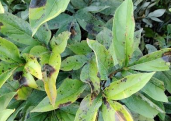Most of the houseplants we enjoy in the home are tropical, meaning they will not survive our outdoor environment. So we bring them inside for the winter so we can continue to enjoy them year-round. Plants need to be fertilized to ensure proper growth and development, especially during the late spring and summer months when warmer temperatures encourage growth. However, fertilizer requirements for most plants need to be reduced during the winter months. At this time watering should also be reduced to correspond with the decline in plant growth. Fertilizing is not necessary right after repotting if a potting mix with compost or other amendments is used. The media will have readily available nutrients and will be able to sustain plant growth. Begin fertilizing again when the plant shows signs of reduced, but active growth. Refer to the instructions on the bag of potting medium to determine when plants should be fertilized. Also, remember not to use a high-nitrogen fertilizer when plants are in bloom. This will result in more foliage production and less flowers.
It may be necessary to periodically flush the soil to leach soluble salts that have built up over time from fertilizer usage. Soluble salt damage (stunted growth, chlorotic or necrotic foliage, and injured roots) is most commonly caused by over-fertilization. All plants need soluble salts to thrive but in varying quantities so read the fertilizer container label carefully. To do this, add water to the container, approximately four to five times the soil volume, to push the salts through the drainage hole in the bottom of the container.





